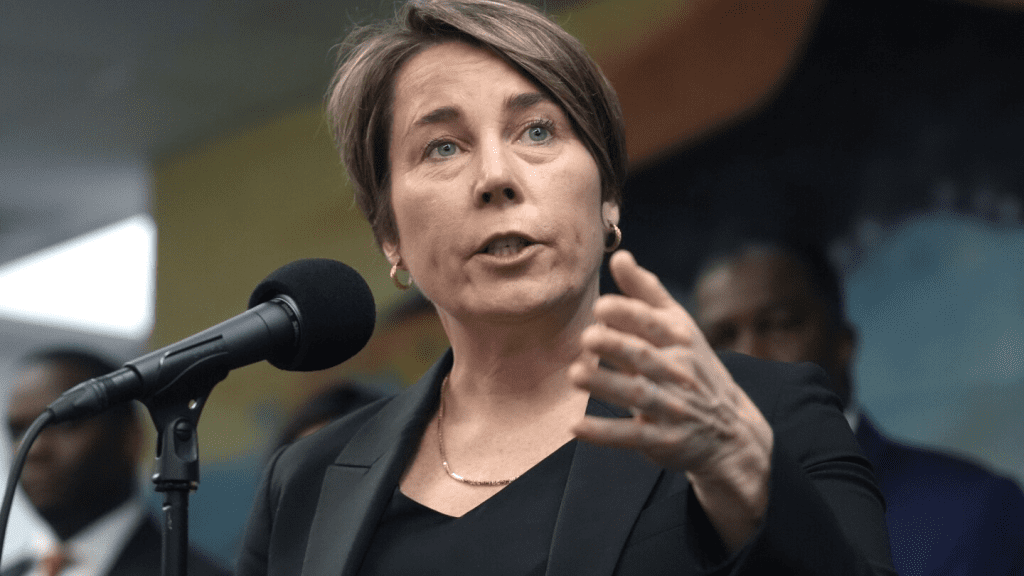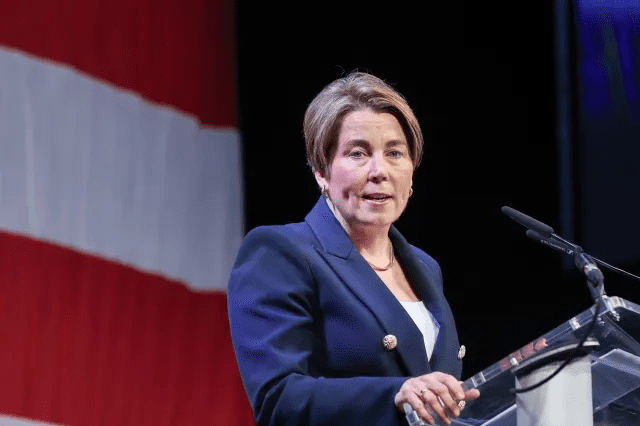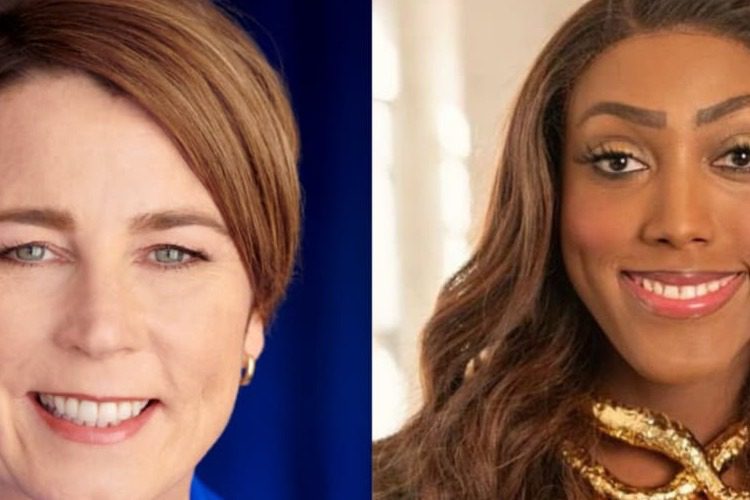Trans Theater Star Giselle Byrd Joins Elite Women’s Commission – Sparking Fury and Fire Over Who Gets to Shape the Future of Sisterhood
The late summer sun filtered through the tall windows of Boston’s State House on a balmy August afternoon in 2025, casting a golden glow over the polished mahogany desks where history’s quiet architects often gather to rewrite the rules of fairness. Governor Maura Healey, her sharp blue suit a nod to the no-nonsense prosecutor she’d been for nearly a decade, signed off on two appointments that would ripple far beyond the Commonwealth’s borders: Giselle Byrd and Candace Pérez, fresh voices tasked with breathing new life into the Massachusetts Commission on the Status of Women. Established in 1965 amid the fervent waves of second-wave feminism, the commission had long been a beacon for tackling the thorny inequities that shadowed women’s lives—from the stubborn wage gap that still nips at heels to the labyrinth of reproductive rights under siege. But this time, the ink on the page carried an extra layer of complexity, one that would soon ignite a transatlantic debate on identity, inclusion, and the very essence of womanhood. Giselle Byrd, a trailblazing Black transgender woman whose life story reads like a script from one of the bold stage productions she helms, stepped into the spotlight not just as a commissioner, but as vice chair of the programming committee—a role that positions her at the heart of crafting policies meant to uplift every woman in the Bay State, regardless of how society once labeled her at birth.

To understand the emotional quake this decision unleashed, step into the shoes of Elena Ramirez, a 42-year-old single mother from Worcester whose mornings begin with the clatter of lunchboxes and the quiet dread of another paycheck that barely covers the rent. Elena, a first-generation Latina who’d clawed her way through community college night classes to become a social worker, had always looked to the commission as a distant but devoted ally—a group that championed paid family leave expansions in 2021, crediting them for the two weeks she took after her daughter’s birth without dipping into savings. When news of Byrd’s appointment broke in late August, Elena scrolled her phone during a rare coffee break, her thumb pausing on a headline that blurred the lines she’d long drawn between her struggles and those of her trans clients at the shelter. “It’s confusing,” she admitted later, her voice soft over the hum of a shelter kitchen, where pots simmered with arroz con pollo for the evening meal. “I’ve fought for my girls to have spaces that are just ours—sports teams, bathrooms, even this commission that gets what it’s like to be a mom grinding through the glass ceiling. But Giselle? She’s got stories that break your heart, too. Does lifting her up mean mine gets lighter or heavier?” Elena’s question hung in the air like so many in Massachusetts that fall, a poignant reflection of a state where progressive ideals clash with the raw realities of everyday equity, and where Healey’s choice became a lightning rod for hearts torn between compassion and conviction.

Giselle Byrd’s journey to that State House signing is one woven with threads of resilience that could fill a memoir—or, fittingly, a one-woman show. Born in Boston’s vibrant but unforgiving urban tapestry, Byrd navigated the intersections of race, gender, and artistry with a grace forged in fire. As executive director of The Theater Offensive since 2019, she’s transformed a scrappy nonprofit into a powerhouse amplifying queer and trans voices of color, staging productions that peel back layers of marginalization like “Black Trans Women in the Workplace” that drew standing ovations at the 2024 Boston Fringe Festival. Her own documentary, “Giselle’s Story,” directed by Susan O’Brien and screened at the Imagine This International Women’s Film Festival in 2023, laid bare the triumphs and traumas of transitioning in a world that often equates visibility with vulnerability. Board seats at the Callen-Lorde Community Health Center in New York and the Leslie-Lohman Museum of Art underscore her reach, a network of advocacy that spans clinics to canvases. When Healey’s office announced the appointments on August 22, Byrd’s inclusion was hailed by allies as a milestone: the first Black trans woman to helm a major regional theater company now steering policy for women’s advancement. “This is about all of us,” Byrd shared in a statement to the commission’s newsletter that September, her words a gentle but firm anchor amid the brewing storm. “Equity isn’t a zero-sum game—it’s the tide that lifts every boat, from the boardroom to the back row.”
Healey, Massachusetts’ first openly lesbian governor and a former attorney general who’d toppled Trump’s travel ban in courtrooms across the land, framed the pick as a natural evolution of her administration’s equity blueprint. Elected in a 2022 landslide on promises of affordable housing and climate action, she’d wasted no time weaving inclusivity into the fabric of state governance: executive orders expanding gender-affirming care access in March 2023, a task force on racial justice in prisons by summer’s end. The Commission on the Status of Women, with its 19 volunteer commissioners drawn from gubernatorial, legislative, and caucus picks, had always been a mosaic—representing women across ages, races, abilities, and orientations, as its charter proudly proclaims. Byrd and Pérez, a Latinx education advocate from Springfield, joined a roster that includes Denella Clark, the trailblazing chair and first woman of color to lead it, appointed under former Governor Charlie Baker and reupped by Healey. “Giselle brings lived experience that enriches our work on everything from workplace discrimination to healthcare disparities,” Healey told reporters at a September 10 presser in Worcester, her tone measured yet unapologetic, eyes scanning the room for the skeptics she knew were gathering. For supporters like the Massachusetts Women’s Political Caucus, it was a win worth celebrating—a step toward the intersectional feminism that Gloria Steinem herself had championed decades earlier, ensuring trans women like Byrd weren’t footnotes but frontlines in the fight.

But as September faded into October’s crisp embrace, the applause gave way to a roar of dissent that echoed from Cape Cod conservatives to national talk radio, turning Byrd’s appointment into a flashpoint for the culture wars that have simmered since the Supreme Court’s Dobbs decision upended reproductive landscapes. Faith-based groups like Massachusetts Family Institute wasted no time, firing off a Facebook missive on September 5 that branded the move a “logical conclusion of feminism gone awry,” accusing the state of rejecting “God’s perfect design” by placing Byrd—a “biological male,” in their stark phrasing—on a body dedicated to women’s voices. “Maura Healey appoints biological man to state commissioner of prominent state-funded ‘women’s rights’ organization,” the post thundered, racking up thousands of shares and comments laced with heartbreak from mothers who’d marched for Title IX protections in the ’70s, now fearing dilution in locker rooms and leadership halls. In Worcester, where Elena works, a local PTA meeting devolved into tears and raised voices, with one grandmother clutching a faded ERA pin whispering, “We’ve come so far just to watch it unravel—who speaks for the girls who bleed every month, who carry babies?” The backlash swelled online, hashtags like #WomenNotWoke trending alongside op-eds in The Boston Herald decrying the commission’s pivot from equal pay audits—where women still earn 82 cents to a man’s dollar in the Commonwealth—to what critics called “ideological theater.”
This isn’t abstract outrage; it’s the palpable ache of a divide that pits progress against preservation, inclusion against inheritance. Take Lydia Thompson, a 38-year-old high school track coach from Framingham, whose daughter Mia, 14, trains for state championships in a sport where trans athletes have sparked lawsuits from Connecticut to California. Lydia, a lifelong Democrat who’d canvassed for Healey in ’22, felt the sting personally when the appointment news hit her feed during a family barbecue. “Giselle’s brave—I don’t doubt that,” she confided to a friend over chardonnay, her fork pausing mid-bite on grilled corn. “But my Mia? She’s got dreams of scholarships, of running under lights without wondering if the starting blocks are level. This commission was supposed to guard that, not redefine it.” Lydia’s words capture the tension roiling women’s circles: surveys from the Pioneer Institute in October 2025 show 55 percent of Massachusetts women supporting trans rights broadly, but only 38 percent favoring shared facilities in schools and prisons—a gap that Byrd’s role, as vice chair shaping programming on violence prevention and economic justice, inevitably bridges or burns.

Healey, undeterred, doubled down in a November op-ed for The Boston Globe, weaving Byrd’s story into the commission’s 60-year legacy: from advising on the 1972 Equal Rights Amendment push to championing the 2024 FAMILY Act for paid leave. “Our work thrives on diverse perspectives,” she wrote, citing Byrd’s theater work as a metaphor for empathy in action—scripts that humanize the marginalized, much like policies that protect all from intimate partner violence, which claims a woman every 11 days in the state. Allies rallied: the Human Rights Campaign praised it as “a model for the nation,” while Byrd herself took to Instagram in early November, posting a photo from a commission hearing on childcare deserts, her caption a quiet clarion: “Womanhood isn’t a monolith—it’s a movement, and I’m honored to march in it.” For Elena, scrolling that post during a midnight shift, it landed like a hand extended across the chasm, prompting her to text a trans colleague at the shelter: “Tell me more about her story.” Small bridges, perhaps, in a storm of suspicion.
Yet balance beckons in this narrative of nerves frayed and futures forged—the commission’s charter, explicit in its embrace of “gender assigned at birth” as just one facet, underscores a truth: Massachusetts, with its 7 percent trans population per Williams Institute estimates, leads in protections like the 2016 bathroom bill that predated national reckonings. Byrd’s tenure, volunteer and unpaid, focuses on programming that touches universal pains—maternal mortality rates 3.5 times higher for Black women, per CDC data, or the 40 percent of single moms in poverty. Critics’ fears of “erasure,” voiced in Heartland Institute reports, warrant hearing: a 2025 study from the Women’s Liberation Front argued trans inclusion in women’s policy bodies risks sidelining sex-based rights, from prisons to sports. But proponents counter with data from the commission’s FY23 report: diverse voices correlate with broader wins, like the 15 percent uptick in funded domestic violence shelters since intersectional audits began. It’s a dialogue, not a duel, where Healey’s hand—steady from her AG days dismantling opioid empires—guides toward synthesis.
As November’s frost etches patterns on State House panes, Byrd’s first full programming slate looms: a December summit on economic resilience, blending panels on gig-worker protections with arts grants for women creators. For Elena, attending virtually from Worcester, it might be the spark that mends her confusion; for Lydia in Framingham, a chance to voice Mia’s stake. Healey’s appointment, bold as a spotlight on a bare stage, reminds us that progress is rarely polite—it’s passionate, prickly, profoundly human. In Massachusetts, where witches once walked to gallows for defying norms, this chapter unfolds not as endgame, but encore: women of all stripes scripting their shared spotlight, one policy, one story, one stitched-together solidarity at a time. The firestorm fades to embers, but the warmth? It lingers, inviting us all to the table—diverse, determined, and daring enough to dream bigger.


